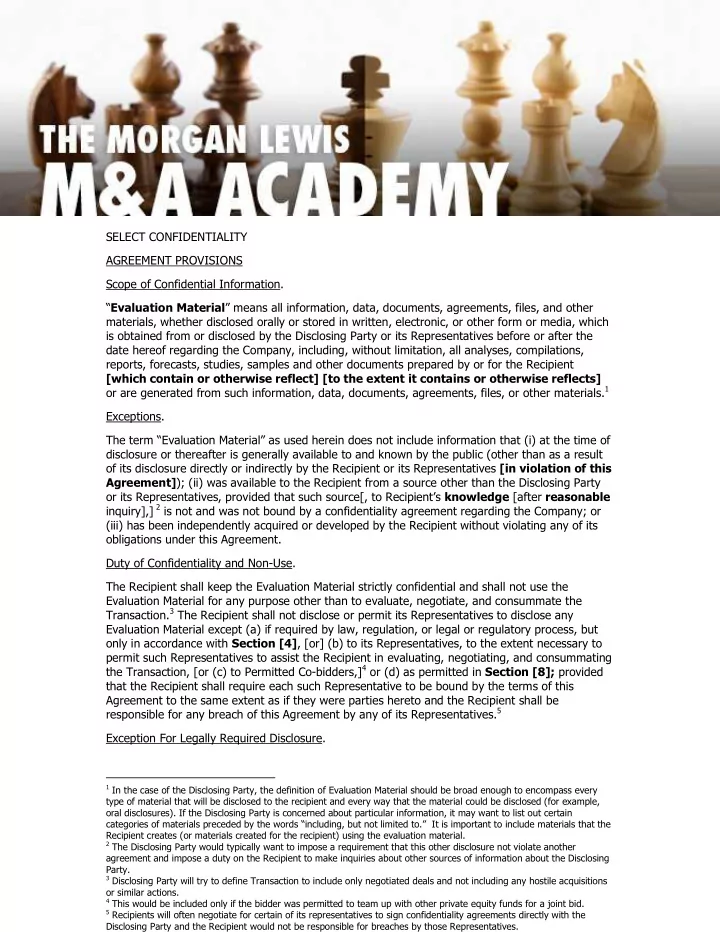

SELECT CONFIDENTIALITY AGREEMENT PROVISIONS Scope of Confidential Information. “ Evaluation Material ” means all information, data, documents, agreements, files, and other materials, whether disclosed orally or stored in written, electronic, or other form or media, which is obtained from or disclosed by the Disclosing Party or its Representatives before or after the date hereof regarding the Company, including, without limitation, all analyses, compilations, reports, forecasts, studies, samples and other documents prepared by or for the Recipient [which contain or otherwise reflect] [to the extent it contains or otherwise reflects] or are generated from such information, data, documents, agreements, files, or other materials. 1 Exceptions. The term “Evaluation Material” as used herein does not include information that (i) at the time of disclosure or thereafter is generally available to and known by the public (other than as a result of its disclosure directly or indirectly by the Recipient or its Representatives [in violation of this Agreement] ); (ii) was available to the Recipient from a source other than the Disclosing Party or its Representatives, provided that such source[, to Recipient’s knowledge [after reasonable inquiry],] 2 is not and was not bound by a confidentiality agreement regarding the Company; or (iii) has been independently acquired or developed by the Recipient without violating any of its obligations under this Agreement. Duty of Confidentiality and Non-Use. The Recipient shall keep the Evaluation Material strictly confidential and shall not use the Evaluation Material for any purpose other than to evaluate, negotiate, and consummate the Transaction. 3 The Recipient shall not disclose or permit its Representatives to disclose any Evaluation Material except (a) if required by law, regulation, or legal or regulatory process, but only in accordance with Section [4] , [or] (b) to its Representatives, to the extent necessary to permit such Representatives to assist the Recipient in evaluating, negotiating, and consummating the Transaction, [or (c) to Permitted Co-bidders,] 4 or (d) as permitted in Section [8]; provided that the Recipient shall require each such Representative to be bound by the terms of this Agreement to the same extent as if they were parties hereto and the Recipient shall be responsible for any breach of this Agreement by any of its Representatives. 5 Exception For Legally Required Disclosure. 1 In the case of the Disclosing Party, the definition of Evaluation Material should be broad enough to encompass every type of material that will be disclosed to the recipient and every way that the material could be disclosed (for example, oral disclosures). If the Disclosing Party is concerned about particular information, it may want to list out certain categories of materials preceded by the words “including, but not limited to.” It is important to include materials that the Recipient creates (or materials created for the recipient) using the evaluation material. 2 The Disclosing Party would typically want to impose a requirement that this other disclosure not violate another agreement and impose a duty on the Recipient to make inquiries about other sources of information about the Disclosing Party. 3 Disclosing Party will try to define Transaction to include only negotiated deals and not including any hostile acquisitions or similar actions. 4 This would be included only if the bidder was permitted to team up with other private equity funds for a joint bid. 5 Recipients will often negotiate for certain of its representatives to sign confidentiality agreements directly with the Disclosing Party and the Recipient would not be responsible for breaches by those Representatives.
If the Recipient or any of its Representatives is required, in the written opinion of the Recipient’s counsel, to disclose any Evaluation Material, by law, regulation, or legal or regulatory process, the Recipient shall (a) take all reasonable steps to preserve the privileged nature and confidentiality of the Evaluation Material, including requesting that the Evaluation Material not be disclosed to nonparties or the public; (b) give the Disclosing Party prompt prior written notice of such request or requirement so that the Disclosing Party may seek, at its sole cost and expense, an appropriate protective order or other remedy; and (c) cooperate with the Disclosing Party, at the Disclosing Party’s sole cost and expense, to obtain such protective order. In the event that such protective order or other remedy is not obtained, the Recipient (or such other persons to whom such request is directed) will furnish only that portion of the Evaluation Material which[, on the [written] advice of the Recipient’s counsel,] 6 is legally required to be disclosed and, upon the Disclosing Party’s request, use its best efforts to obtain assurances that confidential treatment will be accorded to such information. Obligation to Keep Transaction Discussions Confidential. Except for such disclosure as is necessary not to be in violation of any applicable law, regulation, order or other similar requirement of any governmental, regulatory, or supervisory authority [or any applicable listing agreement], the Recipient shall not, and shall not permit any of its Representatives to, without the prior written consent of the Disclosing Party, disclose to any person (a) the fact that the Evaluation Material has been made available to it [or any Permitted Co-bidder] or that it [or any Permitted Co-bidder] has received or inspected any portion of the Evaluation Material, (b) the existence or contents of this Agreement, (c) the fact that investigations, discussions, or negotiations are taking or have taken place concerning the Transaction, including the status thereof, or (d) any terms, conditions, or other matters relating to the Transaction. 6 Disclosing Parties will sometimes require that the Recipient seek advice of counsel before deciding that disclosure is required, and may also sometimes require that this advice should be in writing.
Recommend
More recommend